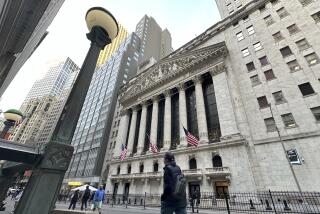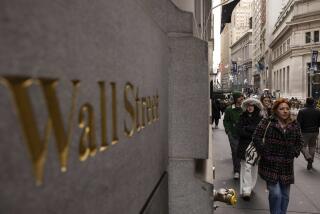Stock indexes end mixed as oil price resumes a slide
The U.S. stock market sagged in the final half-hour of trading on Wednesday after Europe’s central bank withdrew a key financial support for Greek banks. The price of oil plunged, dragging down energy stocks.
The European Central Bank late in the day said that Greek banks could no longer access ECB credit using government bonds or bonds guaranteed by the government as collateral for loans.
The move unsettled investors and knocked most U.S. indexes lower.
Major U.S. indexes got off to a weak start Wednesday as a renewed drop in crude oil tugged down shares of energy companies. The Standard & Poor’s 500 recovered its losses by midday, meandered through the afternoon, then swung from a solid gain to a slight loss in the market’s last 30 minutes following the announcement from the ECB.
“It appears as though the ECB has thrown a huge curve ball at the Greek government by now not accepting their bonds as collateral,” said Tom di Galoma, a long-time bond trader at ED&F Man Capital.
The Standard & Poor’s 500 index fell 8.52 points, or 0.4 percent, to 2,041.51.
The Dow eked out a gain of 6.62 points, or less than 0.1 percent, to 17,673.02 and the Nasdaq sank 11.03 points, or 0.2 percent, to 4,716.70.
The Dow gave up nearly all of a 115-point advance. U.S. government bond prices also rose, pushing yields lower, as traders moved money into safe-haven investments. A big gain in Disney’s stock after that company reported stronger earnings helped the blue-chip index.
Wednesday’s see-saw trading has been part of a recent pattern of volatility. Over the previous six trading days, the market turned in three gains and three losses.
“I think there’s a sense of uneasiness and lack of conviction among investors right now,” said Terry Sandven, senior equity strategist at U.S. Bank Wealth Management. “You see that in the split personality of the market.”
Sandven said rising uncertainty over corporate earnings has helped drive the volatility. Falling oil prices and a stronger dollar have pinched companies’ profits, forcing investors to second-guess their expectations.
Late Tuesday, Walt Disney reported that strong results from theme parks, television channels and selling merchandise tied to its “Frozen” movie drove quarterly earnings up 19 percent. Disney’s profit and revenue trounced Wall Street’s estimates for the quarter, and its stock surged $7.18, or 8 percent, to $101.28, an all-time high.
Bob Iger, Disney’s CEO, said the company was not seeing a hit to attendance from the measles outbreak linked last month to Disney’s Southern California parks.
Ralph Lauren’s stock lost $31.12, or 18 percent, to $139.71, after the retailer reported a drop in quarterly earnings and slashed its sales forecast for the full year. The company spent more to open new stores while revenue stayed nearly flat, held back by a stronger dollar.
The fourth-quarter earnings season now looks better than it did just two weeks ago. Nearly three out of four big companies have turned in higher profits than analysts had expected, putting overall earnings on track to rise nearly 7 percent for the quarter, according to S&P Capital IQ. Two weeks ago, the expected increase was just 4 percent.
A recent rebound in oil prices fizzled out Wednesday as the benchmark contract for U.S. crude fell $4.60, or 8.7 percent, to settle at $48.45 a barrel in New York. The drop came after the U.S. government reported an increase in crude inventories last week.
Oil had rallied over the previous four days as traders speculated that low prices would force more energy companies to curtail exploration and production. Brent crude, a benchmark for international oils used by many U.S. refineries, declined $3.75, or 6.5 percent, to close at $54.16 a barrel in London.
Major markets in Europe ended mixed. France’s CAC 40 rose 0.4 percent and Germany’s DAX edged up 0.2 percent. Britain’s FTSE 100 closed with a loss of 0.2 percent.
On Tuesday, Greece’s stocks and bonds rallied on optimism that the country’s new leftist government would make progress with international creditors on negotiating new terms for its financial rescue program.
In the U.S., Staples announced that it’s buying Office Depot for $6 billion in a widely anticipated merger of the two largest office supply retailers. The cash-and-stock deal comes a little more than a year after Office Depot merged with OfficeMax and still needs approval from regulators. Staples dropped $2.28, or 12 percent, to $16.73.
Prices rose in the market for U.S. government bonds, pushing the yield on the 10-year Treasury note down to 1.75 percent. The yield had been as high as 1.84 percent before the ECB announcement.
In the commodity markets, gold rose $4.20 to $1,264.50 an ounce, while silver rose seven cents to $17.40 an ounce. Copper edged up a penny to $2.59 a pound.
In other futures trading on the New York Mercantile Exchange:
— Wholesale gasoline fell 12 cents to $1.482 a gallon.
— Heating oil fell 8 cents to close at $1.767 a gallon.
— Natural gas fell 9.2 cents to close at $2.662 per 1,000 cubic feet.






